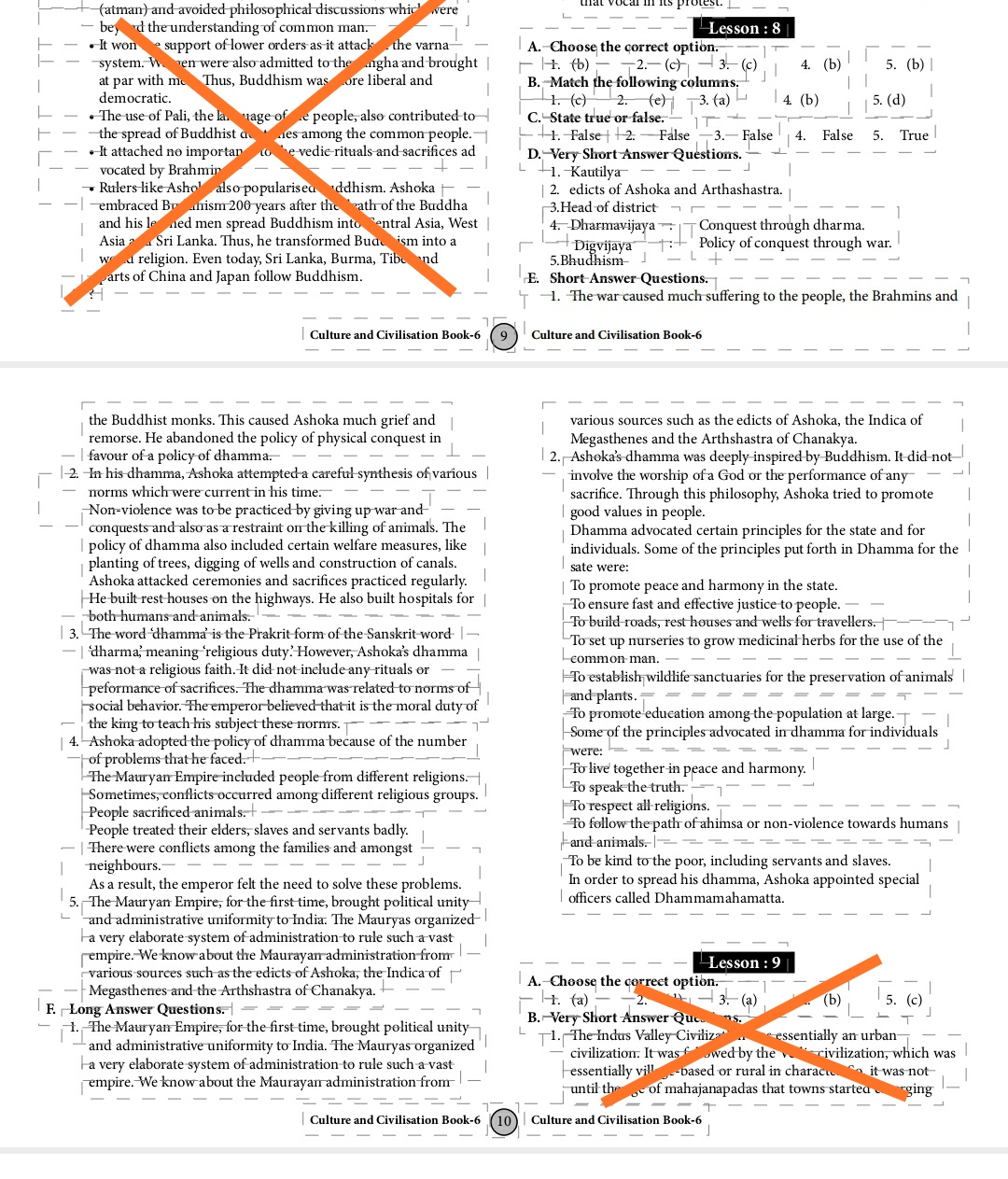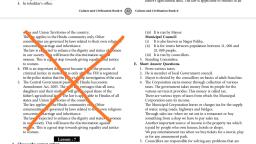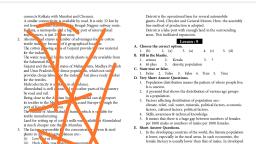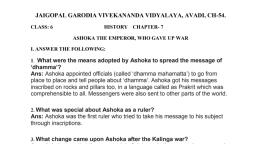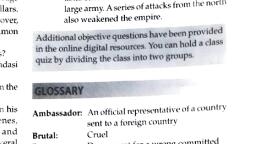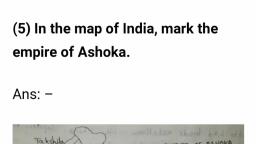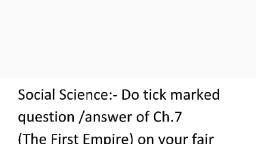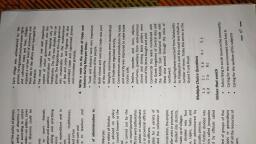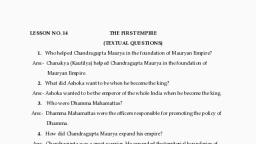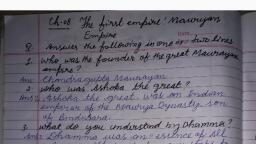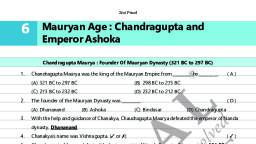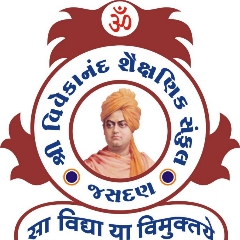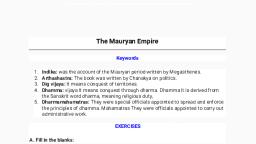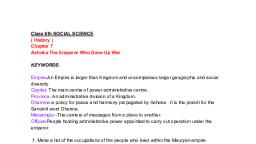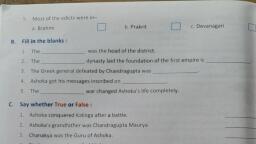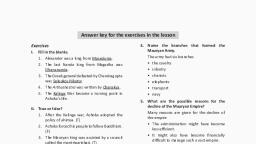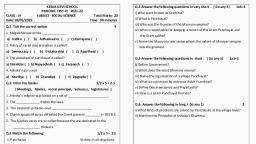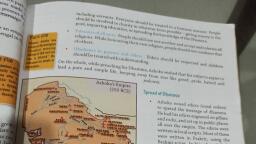Page 1 :
at par with, democratic., , [- — + ltattached no importa -vedic rituals and sacrifices ad, — — vocated by Brahmipg® — “Qo — — — — +, | ~w Rulerstike-as dhism, Ashoka | —, , eath of the Buddha, , arts of China and Japan follow Buddhism., , , , , , | Culture and Civilisation Book-6, , , , the Buddhist monks. This caused Ashoka much grief and, remorse, He abandoned the policy of physical conquest in, favour of a policy of dhamma-— ---J, In his: dhamma, Ashoka attempted'a careful synthesis of,various, , | Nonviolence was torbe practiced-by giving upwarand~ — —, — —' conquestsanchalsorasrrestraint onthe killing of animals. The |, policy of dhamma also included certain welfare measures, like |, planting of trees, digging of wells and construction of canals., ‘Ashoka attacked ceremonies and sacrifices practiced regularly., | He built rest houses on the highways. He also built hospitals for |, both-humans-and-animals:, 3. (The word ‘thamma’is the Prakrit form of the Sanskrit word, ‘dharma! meaning “religious duty? However,Ashoka’s dhamma |, -was nota religious faith It did- not includeany-rituals or — —, | preformance of sscrifices-The dhamma-waselated-tonormeof-|, social behavior-Theemperor-believed-thatit isthe moral duty of, — | the king to-teach-his subject these rrornrs, -— — — —- — ~, 4. Ashoka adopted the policy of dhamrma because of the number, —} of problems that he faced.-+-————————-——————, The MauryarrEmpire included people from different religions—|, | Sometimes;conflicts occurred among different religious groups. |, People sacrificed -animals-! +, People treated their elders; slaves and servants badly., ‘There were conflicts among the families and amongst, neighbours. J, ‘Asa result, the emperor felt the need to solve these problems., 5, ‘The Mauryan Empire; for the first time, brought political unity—!, —“and-administrative uniformity to-india: The Mauryas organized, bavery elaborate-system of administration-to rule suchavast |, empire-We know-about the Maurayarradministration-fromr | —, various sources such-as the edicts-of Ashoka; the Indicarof [~, Megasthenes-and-the Arthshastra of Chanakya. +, |B -Long Answer Questions-|, — 1, The Mauryan-Empire; for the first time, brought political unity, and administrative uniformity to_India. The Mauryas organized |, /a very elaborate system of administration-to rule sucha-vast |, ~empire.-We know about the Maurayarradministration-fromr | —, , I pl, , A. Choose the correct option.—, , nantes: “as “ag, , , , 1, , KH = 72> (oh) > = 4 (by | 5. (b), B. Match the following columns: J |, L Ly teyta—fey) 3.) 14) | | 3@), C.State thueorfalses— |) = 4, , “Hn False} +2; —False -3.— False!) 4. False 5. True, D.-Nery Short-Answer Questions, — - — — — — — —, , “LKautily- — — — — 4, , — 1) —, , | 2. edicts of Ashoka and Arthashastra. ,, pBHead: of district = — —, , , , 4--Dharmavijaya > ) > Conquest through dharma., Digvijaya Policy of conquest through war., 5.Bhudhism, E, Short Answer Questions., 1. ‘The war caused muchsuffering to the people, the Brahmins and, , ® Culture and Civilisation Book-6, , ; :, , | various sources such asthe edicts of Ashoka, the Indica of |, Megasthenes and the Arthshastra of Chanakya., , | 2, Ashoka’ dhamma was deeply: inspired by Buddhism. It-did not!, , — involve the worship ofa God or the performance ofany- — ~!, sacrifice. Through this philosophy, Ashoka tried to promote |, , | good values in people. /, , Dhamma advocated certain principles for the state and for, individuals. Some of the principles put forth in Dhamma for the |, , | sate we, | To promote peace and harmony in the state., “To ensure fast and effective justice to people. |, | sts build-roads; rest houses and-wells for travellers.j-———— ~, ‘Torset up nurseries to grow medicinal herbs for the use of the, |common man., Hfo-establishrwildlife sanctuaries for the preservation of animals |, and plants., fo pronroteleducation among the population at large., | Somernf tire principles advocated irrdhamma forindividuals, f were:, [flee together in peace and harmony. |, fo speakcthe-truth; —, [Ho respect all religions., “o follow thepatir of th, -anc-animals--| :, “To be kind torthe poor, including servantsand slaves. |, In order to spread his dhamma, Ashoka appointed special, | officers called Dhammamahamatta. !, , , , iimsa or non-violence towards humans, , se the, , , , , , , B.-Very Short Answer
